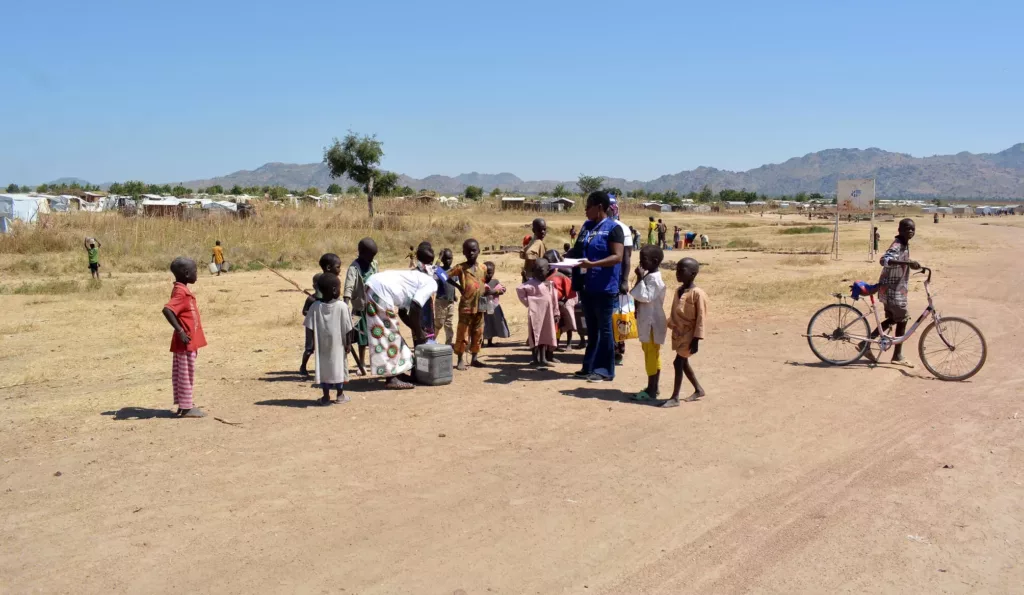Every year, approximately 4 million deaths are prevented by childhood vaccinations. In countries around the world, International Medical Corps delivers lifesaving immunizations—especially to children under 5—in underserved, hard-to-reach communities. In honor of World Immunization Week (April 24–30), we’re sharing the stories of our teams in a few of these countries across Africa and the Middle East.
Somalia
Mu’ad Isak Barre is a 4-month-old boy who lives with his mother, Garey Hassan Adomow, in a camp for internally displaced persons (IDPs). They have lived in the camp called Wadajir for nearly six years. Garey is the mother of six children: two boys and four girls.
Their displacement from a rural area near the Baidoa district of Somalia is due to the prolonged drought in the region, and exacerbated by the persistent threat posed by armed groups. This situation has resulted in a severe humanitarian crisis, with households across Somalia grappling with dire conditions. As part of our response, International Medical Corps sends mobile medical teams to provide health and nutrition services, including immunizations, to people in several IDP camps.
One month after Mu’ad Isak Barre was born, an International Medical Corps health worker visited Garey and her family at home and discovered that Mu’ad had not yet been vaccinated. Our team then administered vaccines to Mu’ad to prevent tuberculosis and polio, and instructed Garey to return regularly until Mu’ad’s vaccination schedule was complete.
“I am glad and grateful that my child received vaccines from the mobile team,” said Garey. “Thank you, International Medical Corps.”
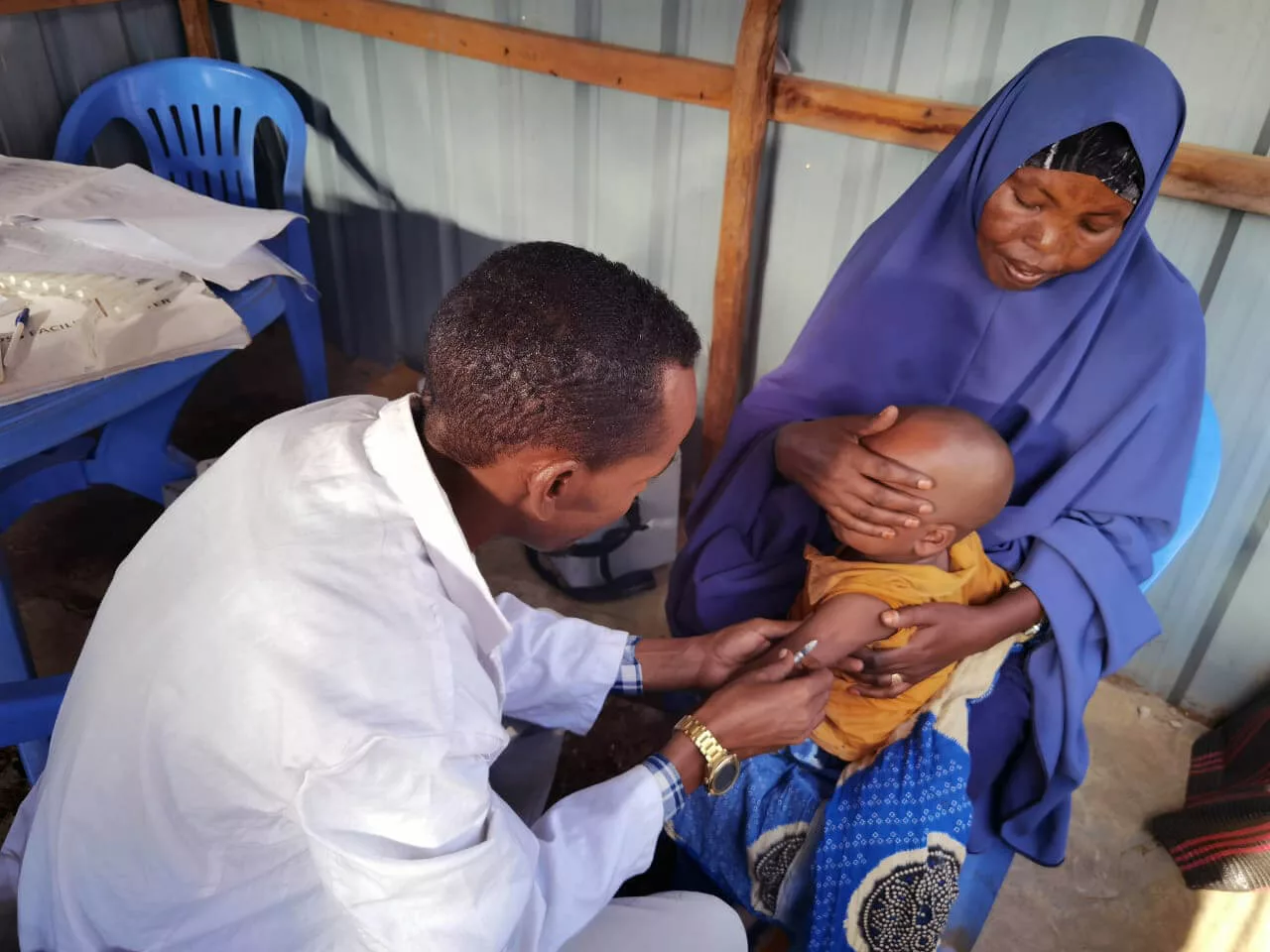
The team’s proactive approach—which includes home visits with every household—underscores our commitment to improving health outcomes and ensuring the well-being of children in these communities.
Cameroon
Several regions of Cameroon are experiencing an ongoing sociopolitical crisis that has led to widespread violence and a breakdown in health services. Despite these challenges, Cameroon is the first nation in history to launch a routine immunization program against malaria. International Medical Corps is supporting the program—which the Ministry of Public Health (MoPH) is implementing in 42 health districts—by providing lifesaving medication to the population of Minawao refugee camp and by training MoPH staff and local volunteers to treat and identify the disease.
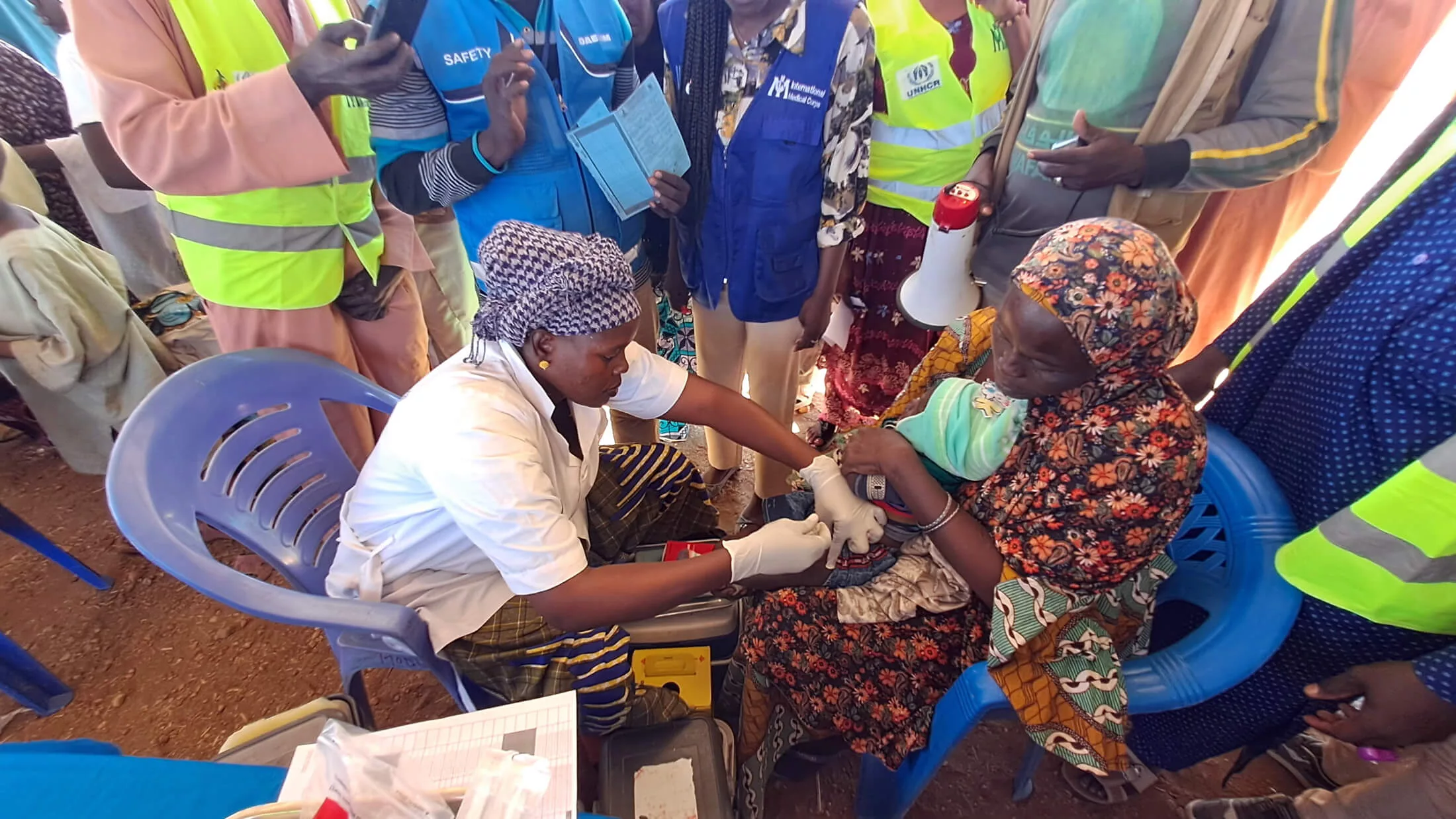
Our Cameroon team is also strengthening priority aspects of the public health system, such as vaccination coverage and surveillance for epidemic-prone diseases like measles. We are supporting the MoPH at the national and regional levels to improve its rapid response to small-scale outbreaks, and have implemented local surveillance capabilities by training community health workers and conducting home visits.
In 2023, cholera outbreaks spread throughout the Minawao refugee camp, located in Cameroon’s Far North region. International Medical Corps teams worked tirelessly with the Mokolo health district teams to combat the disease while providing treatment to the already vulnerable refugee population. That same year, our staff traveled to Oshie, a remote village in the country’s Northwest region, to deliver lifesaving vaccines for vaccine-preventable diseases.
In 2024, our staff has already enacted effective strategies to detect diseases early—conducting prevention activities in communities across our service areas as well as inside health facilities, and coordinating successfully with the MoPH. For example, there have been no new outbreaks of cholera in the Far North region. In fact, there have been no deaths from cholera across the entire country this year, though cholera remains endemic in some regions. Our team remains vigilant, training local health staff and monitoring communities for the early detection of diseases, enabling them to respond quickly to outbreaks.
Yemen
Five-year-old Nawaya lives with her parents and 12 siblings in a remote village in the Al Qafr district of Yemen. The nearest health center is an hour-and-a-half away, and vaccination campaigns had not been conducted recently due to the country’s civil war. As a result, many children in the village—including Nawaya and her four youngest brothers—had never received a vaccination.
To help, our team organized two six-day vaccination campaigns involving long journeys to remote villages. They successfully vaccinated nearly 1,800 children, including Nawaya and her three-year-old twin brothers, Muhammad and Ghazi, as well as her one-and-a-half-year-old twin brothers, Othman and Jawda.
“I didn’t realize the terrible fate my children would face if this team hadn’t come to my home,” Nawaya’s father said. “Thank you for safeguarding my children’s future.”
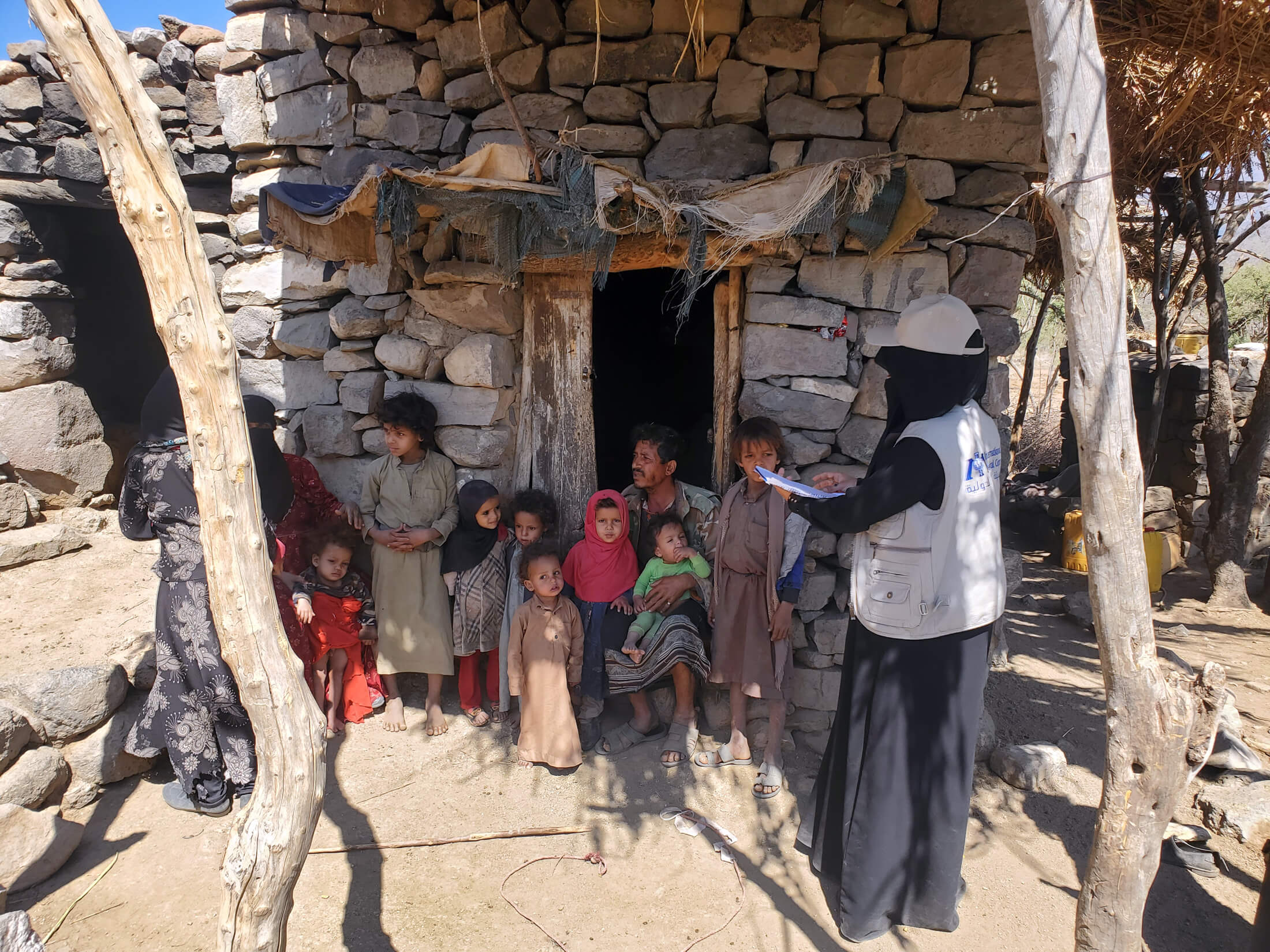
The health workers set a date for the children’s second doses and reminded Nawaya’s father to keep their vaccination cards in a safe place.
Getting vaccines to children in remote parts of Yemen is only part of the problem. In some parts of the country, such as the rural Al Hussein district, tackling vaccine hesitancy is a challenge. Myths and misconceptions about vaccines are common.
Three-year-old Rayhan is adored by her 28-year-old father, Mohammed Mohsen Nagi Hussien, and her 50-year-old grandfather, Mohsen Nagi Hussien Al-Maflahi. When she started coughing and developed a high fever and a hoarse voice, her family was very concerned.
Rayhan’s grandfather took her to an International Medical Corps-supported health facility, where the health worker asked about her vaccination history. Mohsen explained that she’d never received any vaccines, because his family believed that they were unsafe and caused dangerous diseases. The health worker realized that Rayhan’s life was in danger—she had the symptoms of pertussis (whooping cough) and had already developed complications. He advised her grandfather to take Rayhan to the hospital immediately.
Though Rayhan recovered in the hospital, the experience terrified Mohsen. He took her back to the health facility, where a health worker taught him about the importance of early childhood immunizations in preventing diseases such as whooping cough, measles, polio and diphtheria. After he agreed that Rayhan should be vaccinated, Mohsen shared his new knowledge with his friends and family, encouraging them to vaccinate their children, too.
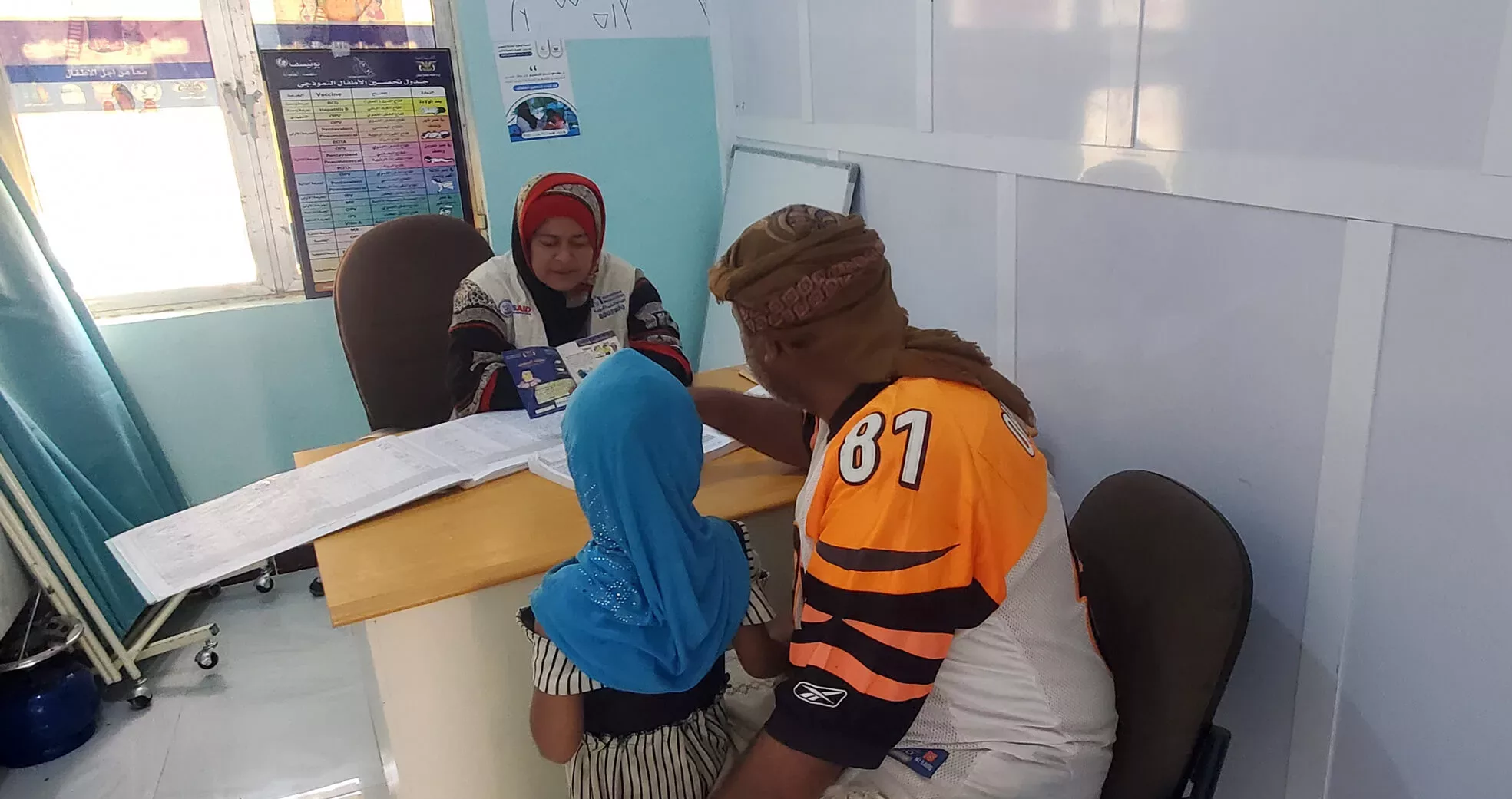
The impact was swift. Other families rushed to the health facility to get their children vaccinated.
“We made the mistake of not vaccinating Rayhan due to our wrong beliefs that those vaccines could harm her,” said Mohsen. “This resulted in her getting a serious infection. We now understand the importance of vaccination, and will ensure that she is protected.”
Afghanistan
In a remote village nestled in the mountains of Nangarhar province, a baby named Zahra* was born to proud parents. When Zahra was six months old, her mother, Noor*, learned of a new International Medical Corps health clinic near their village. Though the trek was difficult, Noor made the journey so her daughter would have the best start in life.
At the clinic, Zahra received her first round of vaccinations, including for tuberculosis and polio. Over the next several months, Noor and her husband made the journey to the clinic for Zahra’s follow-up vaccinations.
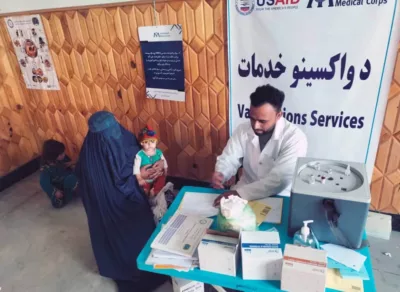
Zahra remained healthy and free from vaccine-preventable diseases thanks to her parents’ commitment and the efforts of the International Medical Corps healthcare workers. Her story spread throughout the village, inspiring other parents to visit the health facility. Together, they formed a community group dedicated to supporting one another in accessing vaccinations and healthcare services.
*Names have been changed to protect privacy.
